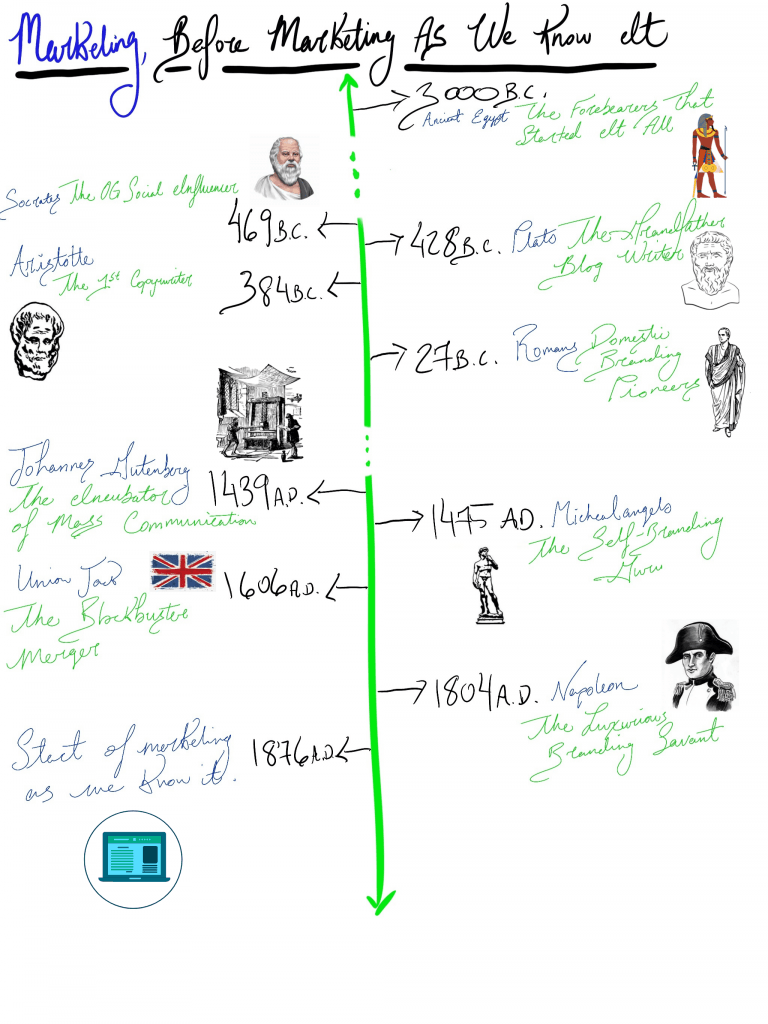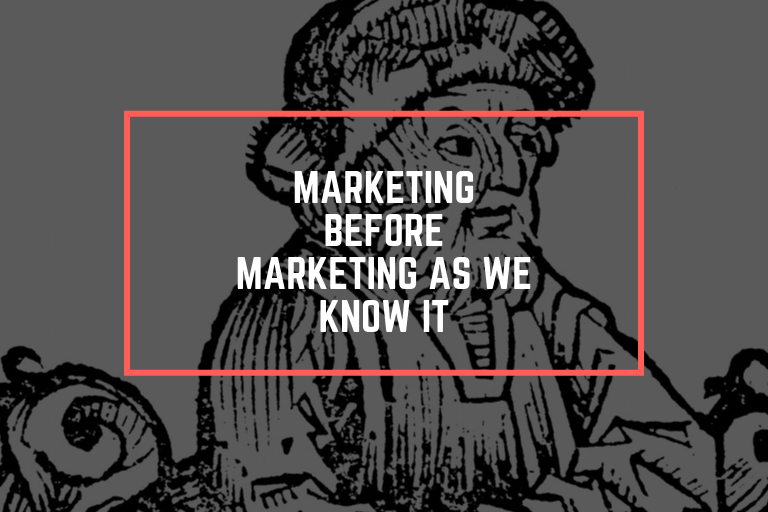Think Socrates was a philosopher pondering the meaning of life, day in and day out?
Truth is, he was a marketer more than anything.
It’s hard to image Socrates in the modern age without a massive following on social media. He was a social influencer in his own right. He truly knew “how to win friends and influence people.”
But he wasn’t the only marketer before marketers as we know it.
The Egyptians were branding trailblazers. The Roman’s stamped domestically made products with “Made in Roma.”
Just likes certain sales techniques, marketing is embedded in human history.
Let’s dive into it.
3000 – 1000 BC: Ancient Egypt, The Foerbearers That Started It All
Around 4,000 years ago, the Ancient Egyptians started it all with mason engraved symbols called stonecutters’ signs.
The construction of the Pyramids used these kinds of bricks. The Ancient Egyptians also branded their cattle as depicted in cave painting.
469 BC: Socrates, The OG Social Influencer
“Answer all questions, question all answers”
Socrates created the Socratic Method, which changed the way humans interact with each other.
This form of debate involves asking and responding to questions to stimulate intellectual growth. Thus laying the foundation of new ideas.
It’s impossible to envision communication in any other way. Social media epitomizes this by providing the opportunity for rapid discourse between individuals. Our modern-day influencers have emerged from these complex networks of communication channels. One could argue that Socrates started it all.
428 BC: Plato, The Grandfather Blog Writer
“Better a little which is well done, than a great deal imperfectly.”
Plato was a big fan of quality content of quantity of content – as true now as it was in 400 BC.
Even Google perpetuates this mode of thinking by promoting quality content over quantity of content. Modern-day businesses are better off heading the perceptive words of Plato. Wisdom is wisdom, even when it is passed down for thousands of years.
384 BC: Aristotle, The First Copywriter
Aristotle is best known for his ideas on Logos (logical reasoning) & Pathos (emotional side of reasoning).
As a business, you want to get at the core of the people who interact with your brand. What better way than to do so by speaking to the logical and emotional side of the people who interact with your brand.
Effective copywriting appeals to these human aspects, thus paving the way for you to drive your marketing message home.
27BC – 467AD: Romans, Domestic Branding Pioneers
Ancient Romans branded their products with “Made In Roma.” Everything ranging from glassware to weaponry was all marked by who made it. Even bread made in Pompeii had branding baked right into the product itself. Sounds pretty familiar, right?
1439: Johannes Gutenberg, The Incubator of Mass Communication
Johannes Gutenberg revolutionized mass communication by inventing the printing press in 1439. This paved the way for the large scale dissemination of information all around the world.
Now we have the World Wide Web; the modern-day version of the printing press. Thank you, Johannes! Besides spam, we can agree we don’t like spam.
1475 AD: Michelangelo, The Self-Branding Guru
Who made the statue of David? Michaelangelo, duh.
Michaelangelo did a great job at branding himself by signing his name on his work, rather than using symbols. He cultivated a whole new culture of personal recognition for the work we do. Something that we continue to embody this very day.
1606: Union Jack, The Blockbuster Merger
The amalgamation of brand identities can result in unique results, as shown when England and Scotland unified under the 1st version of Union Jack. This marks the first blockbuster merger of competing brands — becoming the powerful emblem of a cosmopolitan culture — and paving the way for modern mega-enterprises to form unlikely bonds.
1804: Napoleon, The Luxurious Branding Savant
When you think of luxury brands, companies like Gucci, Chanel, & Louis Vuitton come to mind. But the originator of this concept lived far before the incubation of these brand names.
Napoleon, the Emporer of the French in 1804, was the first to leverage the power of a leader’s brand to create a “royal” identity, embued with exclusivity & luxury.
This concept has since evolved and brands like Rolex are spearheading this idea. Thus, thriving off the image of “royalty” and “individuality.”
1876: Start of marketing as we know it…
Since the dawn of recorded time, we’ve documented many uses of marketing. But January 1st, 1876 marks the first use of the trademark.
The Trademark logo first recognized & protected the red triangle of Bass Ale. Since then, legal bindings of ownership protect brands as we know them today.
In Conclusion
So the story evolves into marketing as we see it today. Our past shows that we are hardwired to market ourselves and/or the products that represent us. It’s woven into the fabric of our society. Taken from the words of the 1st OG influencer to grace this planet, “answer all questions, question all answers.” What are your thoughts?


